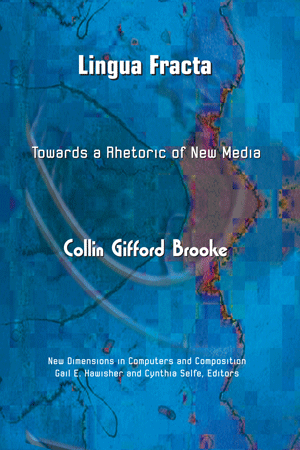Brooke, Collin Gifford. Lingua Fracta: Towards a Rhetoric of New Media.
Cresskill, NJ: Hampton P, 2009. 222 pp, ISBN 9781572738935
Reviewed by Kerri Hauman, Bowling Green State University

INTRO |
|
In Lingua Fracta: Towards a Rhetoric of New Media, Collin Gifford Brooke proposes a framework that, he believes, will allow us to bring new media and writing studies together. This framework involves revising the rhetorical canons “for technological specificity” (7). In so doing, Brooke critically examines the way technology necessarily transforms traditional notions of rhetoric and, at the same time, is transformed by these long held notions. After using the first two chapters to explain the impetus of and lay the groundwork for his arguments, Brooke spends each of chapters 3-7 focusing on one canon at a time, ending the book with a chapter that reiterates the scope and purposes of this project and addresses some of the questions he knows his readers will have. Brooke is certainly not the first to reconsider the canons in attempts to broaden or update their scope (e.g., Paul Prior et al.’s remediation of the canons or more specific revisions such as Paul Butler’s recent book on style), nor does he claim to be. He recommends these reconsiderations, however, with a distinct purpose in mind: to convince us of the importance of creating a new language with which to talk about new media more productively. For Brooke, our disciplinary relevance and respect are what’s at stake here. If we are to remain relevant and respected writing experts, he argues, we can no longer ignore the presence of new media or treat it as just one of many specialties within English departments. What we need to do instead, what this book urges us to do, is recognize the inherently technological aspect of rhetoric as well as the interdisciplinarity of technology so we can join the many conversations already going on around us in order to advance our own discipline.
|